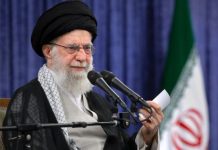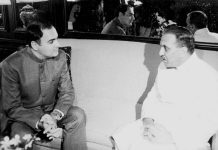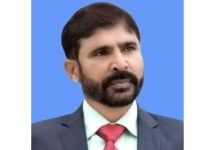By Qamar Bashir
It was deeply disheartening and revolting to witness the way our politicians, bureaucrats, and elites swarmed around Arshad Nadeem like vultures, each trying to claim a piece of his unprecedented victory at the Paris Olympics. As soon as he landed, he was handed a prepared statement to read during interviews, and Mr. Rana Mashood whispered in his ear to praise the Prime Minister or the Chief Minister of Punjab. The Information Minister of Punjab held an exclusive press conference, attributing Arshad’s success to the Youth Festivals organized by Shahbaz Sharif and Maryam Nawaz, claiming that the Punjab Government had sponsored him. The PTI social media brigade was quick to post pictures and videos of Arshad with Imran Khan, asserting their share in his triumph. The media seized the opportunity to use his arrival and victory to boost viewership, creating media products around him to mint money. Social media influencers also jumped on the bandwagon, eager to associate themselves with his success.
The Prime Minister’s Office and the Ministry of Inter-Provincial Coordination (Sports Ministry) underscored their role in Arshad Nadeem’s success. Similarly, the Sports Minister pointed to improvements in sports infrastructure and training facilities as pivotal to Nadeem’s achievement. The PTI claimed that their administration’s efforts in increasing sports funding and establishing new academies were instrumental. The PML(N) stressed that the groundwork for sports advancements was laid during their governance. The PPP emphasized their long-standing support for athletes, focusing on their athlete-centric policies that have fostered talent across the nation. The Pakistan Sports Board (PSB) and the National Olympic Committee (NOC) of Pakistan both underscored their roles in providing training facilities. Corporate sponsors and private sports academies also highlighted their contributions.
Ironically, none of them had the courage to admit and own the defeat of our other forgotten players who participated in the Olympic Games but failed to secure any medals. They failed to acknowledge their lack of leadership, their inability to create a robust system in the country to promote sports and sports education, and their lack of vision to discover and nurture talent from an early age. They did not admit to their failure in continuously grooming athletes until adulthood, which would multiply their chances of showcasing top-notch performances.
Contrary to the grandstanding, in a press conference held at the Embassy of Pakistan in France, Mr. Arshad Nadeem highlighted that his journey to the Paris Olympics was fraught with challenges, impediments, and a severe lack of resources. His story is a reflection of the government’s total failure and our society’s inability to support and nurture talent adequately.
During his arduous journey, he surmounted immense challenges including financial constraints, inadequate training facilities, and injuries. He overcame daunting financial contraints in accessing proper training and competing internationally. Lack of government’s focus on sports and their insensitivity towards nurturing talent, absence of sports infrastructure and lack of advanced facilities hampered his training. He did not receive timely support from the government and sports authorities, which have no vision or mission and are marred with corruption and corrupt practices. He was also confronted with limited access to top-notch medical care.
Having the experience of witnessing firsthand how the entire vested interests suddenly awaken from their dreamy sleep to capitalize on the hard work and labor of others, it is disheartening to see the cycle repeat itself. These individuals, who are quick to claim credit and make grand promises of change and improvement, will soon revert to their old ways. They will forget their lofty claims, neglecting the systemic issues that need addressing, and instead, they will put their heads down and resume piling up wealth for themselves and their dear ones.
This is the ripe moment for civil society to come forward and compel the government, instead of capitalizing on the hard work of others, to benchmark the best practices of a successful country like China and build a diverse and all-inclusive sports ecosystem in the country.
Pakistan can significantly enhance its sports development by emulating China’s successful strategies. China’s remarkable transformation from an underdeveloped nation to a sports powerhouse is largely due to strong government support, effective policy implementation, and substantial investment in sports infrastructure and athlete development programs.
Civil society should pressure the government to prioritize sports in its national agenda, ensuring sustained investment and creating policies that support long-term athlete growth. Establishing grassroots development programs similar to China’s, with a focus on early talent identification and specialized coaching, can provide young athletes with the necessary support to excel.
Civil society should also press the government to invest in professional coaching and provide athletes with international exposure through competitions and training camps abroad. Additionally, developing a comprehensive athlete support system, including access to sports science, nutrition, psychology, and medical care, is essential.
The government must be urged to provide the best possible care and resources to maintain peak physical and mental condition for athletes in diverse sports, not just cricket and hockey. Establishing a well-structured competitive sports system with regular local, regional, and national competitions will help athletes hone their skills and prepare for international events.
The private sector in Pakistan can significantly enhance the sports ecosystem to produce world-class Olympic players by investing in high-quality infrastructure, providing financial support through sponsorships, and establishing talent identification and development programs. Partnerships with educational institutions can integrate sports into the educational system, while bringing in professional coaches and sports experts can elevate training standards. Additionally, investing in sports science and medicine will ensure comprehensive athlete support. Organizing local and national competitions can create a competitive environment, and media and marketing efforts can raise public awareness and interest. Incorporating sports development into corporate social responsibility initiatives and collaborating with the government and NGOs can further strengthen these efforts, creating a synergistic approach to fostering athletic excellence in Pakistan.
Let us work together to create a system where not only victories are celebrated and capitalized, but defeats are also acknowledged and transformed into triumphs through collective national efforts.
By Qamar Bashir
Former Press Secretary to the President
Former Press Minister to the Embassy of Pakistan to France
Former MD, SRBC, CEO, ATV

















